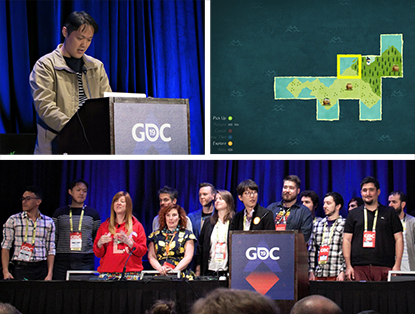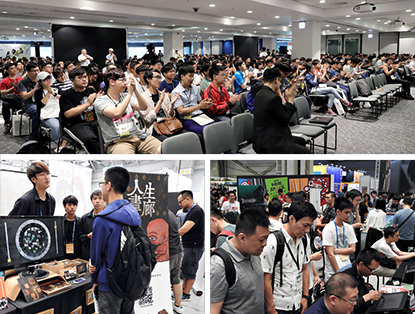Sponsorship of Game Developer Communities in Taiwan 2019Date: 2019-07-27
Section: Sponsorships |  本會自2011年起便陸續贊助國內獨立遊戲開發者,前往海外參與各項獨立遊戲作品相關競賽,並鼓勵開發者前往海外交流,關注目前全球遊戲媒材的變化與創新趨勢。本年度贊助「日頭遊戲」團隊作品《Carto》,前往GDC遊戲開發者大會的實驗型遊戲發表活動Experimental Gameplay Workshop登台發表,同時這也是首度有台灣團隊於該發表活動中獲選,並獲得熱烈的迴響。 本會自2011年起便陸續贊助國內獨立遊戲開發者,前往海外參與各項獨立遊戲作品相關競賽,並鼓勵開發者前往海外交流,關注目前全球遊戲媒材的變化與創新趨勢。本年度贊助「日頭遊戲」團隊作品《Carto》,前往GDC遊戲開發者大會的實驗型遊戲發表活動Experimental Gameplay Workshop登台發表,同時這也是首度有台灣團隊於該發表活動中獲選,並獲得熱烈的迴響。
Since 2011, the ARF has been successively sponsoring Taiwan independent game developers in their participation in independent game related competitions overseas, lightening the burden of travel expenses for these developers so that they can participate in overseas exchange and interaction, and keep up with changes and trends in game media worldwide. This year, the ARF sponsored Sunhead Games’ “Carto” for its debut at the GDC Experimental Gameplay Workshop. It is also the first time a Taiwan team has been selected for the event and garnered great response.
 此外,在鼓勵開放分享以及人才培育的脈絡之下,本會亦循著支持開源論壇活動之模式,針對台北遊戲開發者論壇進行贊助。這項活動是近年來國內遊戲開發相關專門研討會中,完全由民間社群參與資助之代表性活動,在2019年已堂堂邁入第8屆,參加者規模超過上千人,研討內容則涵蓋遊戲開發相關之設計、美術、程式、音樂音效與專案管理,以及擴展到社群營造、市場商務、未來趨勢觀察等多面向議題;本會期望透過投入相關活動,能讓開發者間的交流更加活絡,才能進一步傳承經驗、面向國際。 此外,在鼓勵開放分享以及人才培育的脈絡之下,本會亦循著支持開源論壇活動之模式,針對台北遊戲開發者論壇進行贊助。這項活動是近年來國內遊戲開發相關專門研討會中,完全由民間社群參與資助之代表性活動,在2019年已堂堂邁入第8屆,參加者規模超過上千人,研討內容則涵蓋遊戲開發相關之設計、美術、程式、音樂音效與專案管理,以及擴展到社群營造、市場商務、未來趨勢觀察等多面向議題;本會期望透過投入相關活動,能讓開發者間的交流更加活絡,才能進一步傳承經驗、面向國際。
To encourage open sharing and talent nurturing, the ARF has sponsored the Taipei Game Developers Forum in the same way it has supported open source forums. Of all the game developer conferences held in Taiwan in recent years, the Taipei Game Developers Forum stands out by being an event that is fully funded by private communities. Held for the eighth year in 2019, it had an attendance of over a thousand. The diverse range of topics discussed at the forum included game development related design, art, programming, music/ sound effect and project management, community building, commerce and future trend observation. It is hoped that participation in the event will allow developers to interact more actively, share their experience and take their games international.
|
|